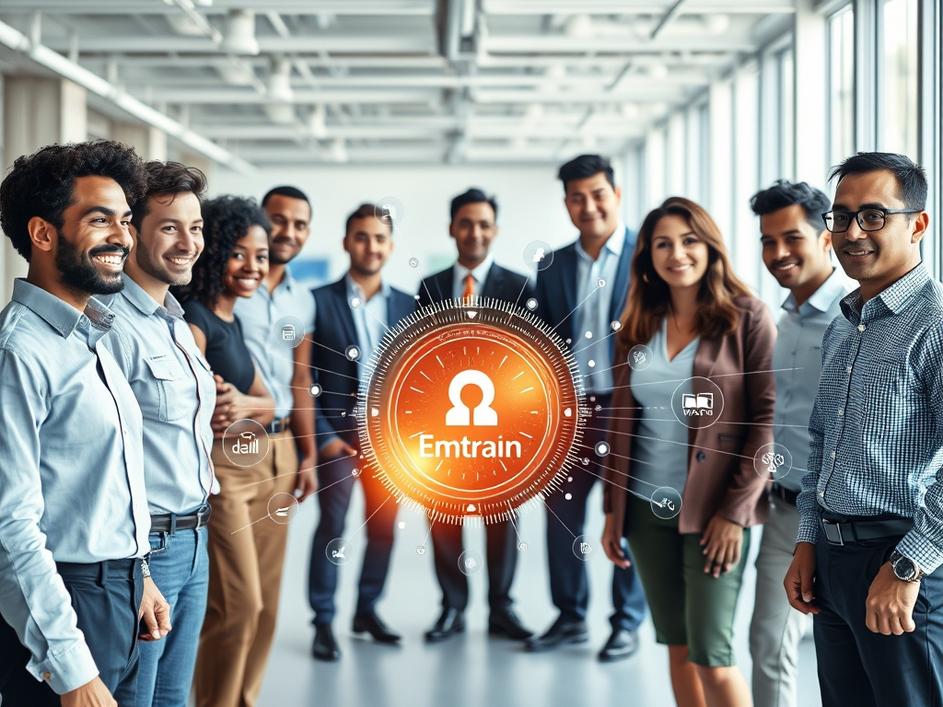


We are a digital agency helping businesses develop immersive, engaging, and user-focused web, app, and software solutions.
2310 Mira Vista Ave
Montrose, CA 91020
2500+ reviews based on client feedback

What's Included?
ToggleLet’s be honest. For many of us, the words “compliance training” conjure up images of dull, click-through modules. We’ve all been there: fast-forwarding through slides, answering multiple-choice questions we barely read, just to get the certificate and move on. It often feels like a box-ticking exercise, a necessary evil rather than something genuinely helpful or engaging. But what if it didn’t have to be that way? What if compliance training could actually teach you useful skills, help prevent problems before they start, and even make your workplace a better, safer place to be? That’s the big question companies are starting to ask, and it’s at the heart of what Emtrain and Workday are now doing together. This isn’t just about two tech companies linking up; it’s about changing how we think about rules and learning at work.
Workday is a huge name in the world of managing people and money for businesses. Millions of employees interact with Workday every day, whether it’s for their pay stubs, vacation requests, or checking benefits. So, when a company like Emtrain, which focuses on modern compliance training, connects directly with Workday’s learning system, it’s a pretty big deal. Think about it from an HR manager’s perspective: instead of jumping between different systems, manually importing lists, or chasing people down for training records, everything can now talk to each other seamlessly. This means less administrative headaches, more accurate data, and a smoother experience for everyone. Employees can find their required training right where they already go for other work-related tasks, making it less of a chore and more just another part of their workday. This kind of integration takes away a lot of friction, and when things are easier to use, people are more likely to actually use them. It’s a smart move that benefits the people doing the work and the people managing the work.
Emtrain’s approach to compliance training isn’t just about memorizing regulations. They push for something called “skills-based compliance.” What does that mean? Instead of just saying, “Don’t harass anyone,” it might teach you *how* to recognize microaggressions, *how* to intervene safely if you see something inappropriate, or *how* to have a difficult conversation with a colleague about their behavior. It’s about giving people practical tools and understanding the nuances of human interaction in the workplace. Traditional training often focuses on the letter of the law, which is important, but it sometimes misses the spirit of creating a respectful environment. By shifting to skills, Emtrain helps employees develop the actual behaviors that lead to a compliant and positive culture. This makes the training far more relevant and, frankly, more useful than just checking a box. It’s about turning legal requirements into opportunities for personal and professional growth, making people better colleagues, not just compliant ones.
Another really interesting part of Emtrain’s offering is its “risk intelligence.” This isn’t just a fancy term; it’s about using data to understand what’s really happening in a company’s culture. As employees go through Emtrain’s training, the system collects anonymous insights into how people respond to various scenarios. For example, are there common misunderstandings about what’s considered harassment? Are people confident they know how to report an issue? This data isn’t about identifying individuals, but about spotting patterns and potential problem areas within the company as a whole. Imagine being able to see, in real-time, if a particular department is struggling with understanding diversity and inclusion concepts. With this kind of intelligence, leaders can proactively address issues, adjust training, or provide targeted support *before* small problems escalate into big, costly legal or cultural crises. It’s like having an early warning system for your company’s social health, allowing businesses to be proactive rather than just reactive when it comes to maintaining a healthy and ethical workplace.
The combined power of Emtrain’s smart training and Workday’s wide reach means a lot for businesses today. First, it streamlines operations. HR and L&D teams spend less time on manual tasks and more time on what matters: supporting employees and shaping culture. Second, it makes training more effective. When training is relevant, skill-focused, and easy to access, employees are more likely to engage with it and apply what they learn. This doesn’t just reduce legal risks; it builds a stronger, more respectful, and inclusive workplace. When people feel safer and more valued, they’re more productive and happier at work. For the 70+ million Workday users, this integration signals a future where compliance training isn’t just a mandate, but a meaningful part of their professional development. It reflects a growing understanding that a healthy workplace culture isn’t just a ‘nice to have’ but a fundamental driver of business success and employee well-being. This kind of approach helps companies move past simply avoiding trouble to actively building environments where everyone can thrive.
This integration between Emtrain and Workday is more than just a software update; it’s a clear signal about where workplace learning and development are headed. The days of generic, one-size-fits-all training are slowly fading. We’re moving towards systems that are more integrated, data-driven, and focused on practical skills. Learning is becoming less about isolated events and more about continuous development that’s woven into the fabric of daily work. By linking up, Emtrain and Workday are showing how technology can make compliance less of a burden and more of a genuine opportunity to strengthen a company’s most valuable asset: its people and its culture. It’s an exciting step towards a future where training isn’t just about meeting minimum requirements, but about actively building a better, smarter, and more ethical place for everyone to work. It’s about leveraging smart tools to foster real human understanding and better behaviors, making workplaces not just compliant, but genuinely thriving.



Comments are closed